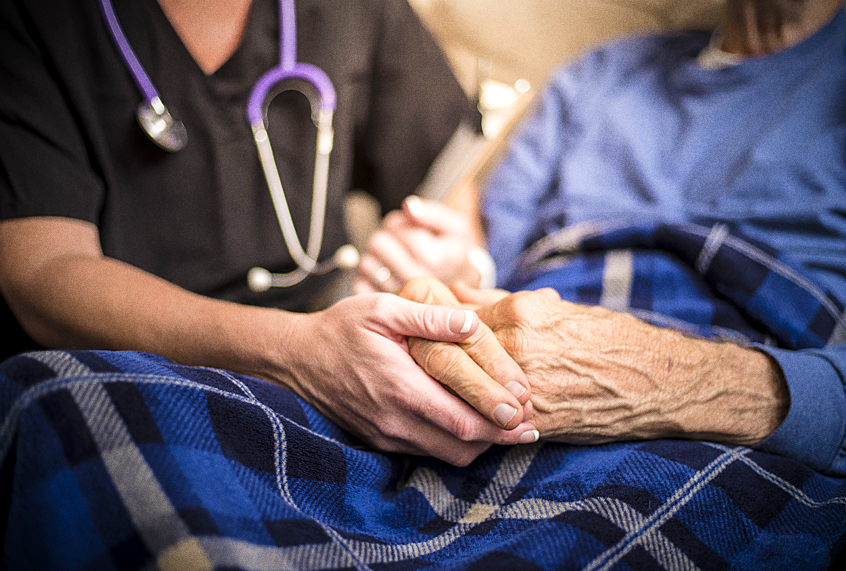These days, physicians spend twice as much time looking at computers as they do patients. This is not only true for health professionals; the majority of our daily communications occur through a device and not between people. Our new habits may save time, but they don’t feed us. We have more “likes,” but we’re lonelier. Technology is eroding our social connections, which prevents the healing that’s fueled by face-to-face human connection.
The advancement of technology is mind-boggling in its ability to run algorithms and evaluate images. At the going rate, a computer will soon be programmed to listen to a variety of symptoms and come up with an accurate diagnosis with a logical treatment plan. Already, computers are better than experienced radiologists in detecting cancerous lung nodules on CT scans. Better than ophthalmologists at detecting diabetic retinopathy on a retinal scan. And better than dermatologists at detecting a melanoma through highly sensitive dermatoscope. A programmable computer is like a dermatologist with perfect memory who has been in practice for 1,000 years. This artificial intelligence (AI) will perform many of the functions that those of us in the health professions do today.
But there’s one big problem. The intelligence is artificial.
What humans offer is a different type of AI: Authentic Intelligence. This recruits the full capacity of information through listening to words and watching how they’re spoken. It encourages a compassionate connection that allows information to flow between two people and builds trust, hope and a positive expectancy toward the belief that healing is possible. This process, if cultivated through authentic intelligence, is one of the most powerful tools we have. As the grip of artificial intelligence strengthens, we in healing professions will need to spend more time relearning the art of authentic intelligence.
In my own research, I have found that we have the astounding ability to help others in a way that prompts their healing from within. My colleagues and I studied the compassionate connection in primary care clinics at the University of Wisconsin. We taught doctors to interact with patients using techniques of deep listening and empathy. We found that those who rated their doctors high in empathy recovered from the common cold a day faster with milder symptoms than those who didn’t. This wasn’t just feel-good therapy; patients who felt a connection produced increased levels of disease-fighting immune cells.
Just like the power of the smart phone, health care has been warped by the promise of pharmaceutical technology. We have become over-reliant on medicines to treat a symptom while not taking time to get at what the symptom is trying to teach us. This has resulted in 36 percent of Americans being on five or more medicines. Polypharmacy and this “pill for every ill” mentality has helped feed the opioid epidemic. We give the power to morphine to treat human suffering, not realizing that the pill’s potential is often incomplete. It simply masks a symptom and does not cultivate a process of meaning and understanding that arises when two humans connect and care about each other.
Further evidence of this therapeutic connection comes from a team led by a neurophysiologist Luana Colloca at the University of Turin in Italy. They compared how people fared after surgery when they received pain medication in two distinct scenarios. For some, a nurse entered the room post-surgery and announced that the patient would be getting a powerful analgesic that would make the pain subside in a few minutes. A clinician then arrived and administered the treatment. For a second group, there was no announcement and no one to inject the drug. The patients received the same dose of medication by way of an IV injection from an automatic infusion machine and weren’t even informed when the infusion was begun.
Dr. Colloca found that patients receiving the drug by machine needed a 50 percent higher dose of painkiller than those who anticipated feeling better and got the drug from the nurse. In addition, one hour after treatment, patients on the drip described their pain as “much higher” than those who were administered the drug by human hands. The expectancy created (we are going to give you a pain medication to help you feel more comfortable) and the actual presence of a person giving the medicine significantly enhanced its effect. The lived experience is so much more than just the intrinsic effect of an analgesic. Recent research has shown that positive expectations regarding pain through a “therapeutic ceremony” reduces its severity by 28.4 percent, which is the equivalent of an average-size adult taking 8 mg of morphine.
This human connection needs to be reawakened, cultivated and taught. Its absence in health care is partly responsible for more than 50 percent of physicians in America experiencing at least one symptom of burnout as the medical culture requires more time with computers than humans. The lack of understanding about how the art of connecting can influence healing extends beyond health care to all of society. Firing people through a tweet without a dialogue about what matters encourages a “me vs. you” mentality that can lead to inequity, racism, partisanship and misunderstanding. To heal each other and our differences, we need to take the time to listen, understand and respect one another, human to human.
When we are willing to participate in this therapeutic dance, a process unfolds in which authentic healing blossoms and everyone benefits.
# # #
Dr. David Rakel, author of The Compassionate Connection: The Healing Power of Empathy and Mindful Listening (W. W. Norton & Company), was founder and director of the University of Wisconsin Integrative Medicine program. He is now professor and chair of the Department of Family & Community Medicine at the University of New Mexico. He lives in Albuquerque.

